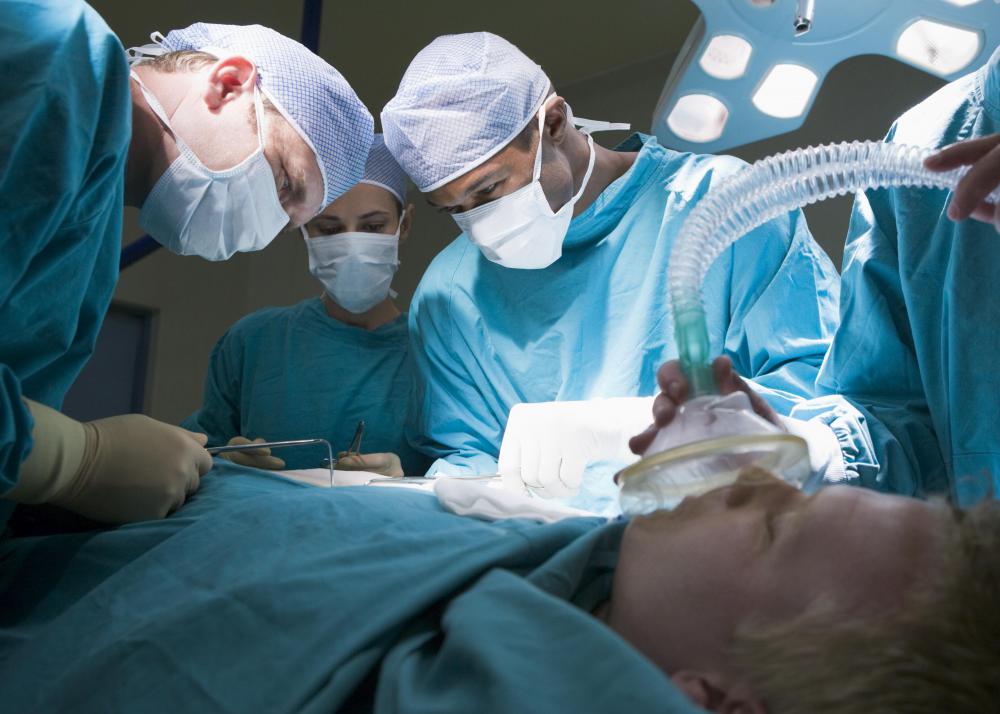At TheHealthBoard, we're committed to delivering accurate, trustworthy information. Our expert-authored content is rigorously fact-checked and sourced from credible authorities. Discover how we uphold the highest standards in providing you with reliable knowledge.
What is the Function of the Appendix?
The function of the appendix, known more formally as the vermiform appendix, is a topic of debate in the medical community. Some clinicians and scientists believe that it is a vestigial organ, a remainder from a time when humans ate a diet high in cellulose and needed assistance with digestion. Others argue that the organ actually serves several important functions in the body related to the immune system. Physicians err on the side of caution today, only removing the organ in situations where it is medically indicated instead of routinely removing it during abdominal procedures as was once common.
As the name implies, the vermiform appendix does indeed look like a small worm attached to the cecum, a pouch that joins the large and small intestines. It shows up relatively early during embryological development and appears to secrete hormones that may play a role in maintaining homeostasis in the developing fetus.

In adults, the appendix contains lymphoid tissue and it has been linked with immune function. Some researchers suggest that it is involved in storing and presenting antigens to the immune system so that it can detect the difference between friend and foe in the gut. The gut is exposed to a wide variety of substances, making it critical to keep the immune system constantly updated so that it does not mistakenly attack beneficial foods or bacteria. This organ, along with other structures like Peyer's patches, may be involved in local immunity for the intestines.

Studies on this part of the gut anatomy have shown that it also may serve as a storing place for beneficial gut flora. When people are sick and the gut is cleaned out with bouts of diarrhea, probiotic bacteria may be trapped in the appendix. Once the person recovers, the bacteria can be released to repopulate the gut and allow the patient's digestive tract to return to normal. Such bacteria are an important part of digestion and there is some logic in the suggestion that the body would want to create a reservoir to store them.

Another function of the appendix is one that was not evolutionarily intended: it can be used as a replacement bladder. If the healthy organ is left intact, it can be recycled in the event that a patient develops bladder disease. The appendix has also successfully been used to make a stand-in for a damaged ureter. While the other functions that have been proposed to explain this organ may be subjects of debate, the surgical utility of the appendix is undeniable.
AS FEATURED ON:
AS FEATURED ON:

















Discussion Comments
I would like to replace my lost appendix as I have definite/pronounced negative immune symptoms since my appendectomy not to mention constant low level pain! If anyone knows how to regrow mine like they do nowadays with teeth (by ultrasonic stimulation etc) I'll be eternally grateful and am ready to be the first (?) one to try a preferably non-invasive procedure.
I think human evolution is wiser than the doctors' opinion. I think the appendix and tonsils should stay where they are.
I have a hard time believing the appendix is really a vestigial organ with no function. Why would it show up so early in fetal development if it didn't even do anything? I think it definitely serves a purpose, which I'm sure the medical establishment will eventually find out.
I had no idea that the appendix surgery could be done to make a stand-in bladder or to replace a damaged ureter. That is pretty awesome actually! And it would definitely decrease the risk of rejection (or maybe make it zero) because you're using the person's own organ.
The only problem with this I see is that if the appendix is made into a bladder, then it's obviously not functioning as an appendix anymore. If the appendix really does does so something related to the immune system, then doing this could maybe disrupt the patient's immune function.
@simrin - I was thinking about tonsils too when I was reading about how doctors used to just remove the appendix all the time, but they don't anymore! I'm 27, and I don't know anyone who has had their tonsils out. On the other hand, my mom is 57, and she told me she knew a lot of people who had their tonsils out very young. However, her parents didn't agree with just taking the tonsils out, so she never had hers out.
Anyway, I think the only time doctors should remove the appendix is if a person has life threatening appendix inflammation from appendicitis. Other than that, there doesn't really seem to be any good reason to just remove it.
I remember when I was in primary and middle school, we were taught that the appendix had no function. If someone in school had their appendix removed, it was no big deal because it didn't do anything anyway.
I was too young then to think about this at that time. But over the years, as I took more biology and science courses in college, I understood that every organ, tissue and cell in our body has a function. Why would the appendix be the only one that doesn't?
One common explanation I was told was that the appendix has the role of warning us when an infection starts so that it can be treated early. If an infected and ruptured appendix is removed, the person doesn't suffer any complications. Whereas if the infection spreads to the surrounding organs which are vital, there will definitely be problems.
I'm not sure if I agree with this explanation. Regardless, I'm of the view that the appendix definitely has a function. The possible functions mentioned in the article make a lot of sense. I would love to see scientific proof in the future about them.
@simrin-- That is based on a theory that the appendix is a vestigial organ. The theory says that the appendix is the remnant or trace of an organ that we once had that served a function. When we lost the need of that function, the organ wasn't eliminated from the system altogether and the appendix is the remnant of it. I don't agree with this theory.
I'm of the opinion that the appendix functions as a reservoir of good bacteria. The reason we used to think that it had no function is because we don't rely on this reservoir unless there is an extreme circumstance that wipes out the flora of bacteria in our body. That takes something like a serious digestive disease.
If the appendix allows us to digest cellulose, don't we still rely on it for that function to some extent? I mean, I eat a lot of raw and cooked vegetables, in addition to meat. There are also people who have a purely raw vegetarian diet. So how is it that the appendix is not necessary in that way any more?
The medical treatment of the appendix seems similar to tonsils. In the past, doctors would remove tonsils left and right whenever it was inflamed and painful. Last year, I had a throat infection and terribly inflamed tonsils. But my doctor decided not to remove it and eventually it healed with antibiotic treatment. I guess the same is happening to the appendix now.
Post your comments